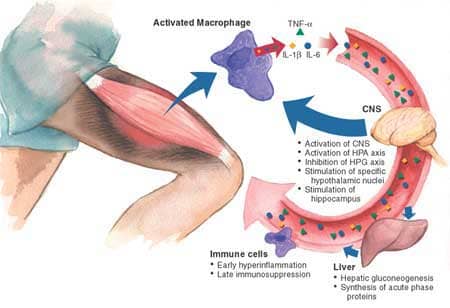Regular exercise can improve physical fitness, enhance overall well-being, and may also strengthen the immune system. Prolonged excessive exercise, however, especially in conjunction with inadequate rest and other stresses, can result in an impairment of athletic performance. This is often associated with a complex of seemingly unrelated physical and psychological symptoms (see Table 1), a condition known as Overtraining Syndrome (OTS). Although overtrained individuals usually exhibit a variable number of the symptoms listed, upper respiratory tract infection is common and may suggest impaired immune function.
 |
| Fig. 1. Excessive exercise with inadequate rest can result in acute inflammation that evolves into a chronic response. A systemic immune response involves the central nervous system (CNS), the liver, and the immune system. [Figure is adapted from Smith, L. et al. (2000) Med. Sci. Sports Exerc. 32:328.] |
A number of hypotheses have been proposed to explain various symptoms associated with OTS, yet none have sufficiently accounted for all the manifestations of the syndrome. A recent article in Medicine and Science in Sport and Exercise presents an all-encompassing hypothesis focused on the role of cytokines in initiating and perpetuating OTS. The Cytokine Hypothesis suggests that exercise-induced muscle and connective tissue microtrauma triggers the release of pro-inflammatory cytokines (e.g. IL-1 beta, IL-6 and TNF-alpha), which when sufficient rest is allowed, can aid in the healing process. The acute inflammation that results from excessive exercise with inadequate rest, however, evolves into a chronic response resulting in a systemic immune response involving the central nervous system (CNS), liver, and immune system (see Figure 1).
CNS function may be influenced by circulating cytokines. IL-1 and IL-6 receptors have been localized to the hypothalamus and thus may modulate both the hypothalamus-pituitary-adrenal (HPA) axis and the hypothalamus-pituitary-gonadal (HPG) axis. These systems are regulators of the stress hormones and reproductive hormones, respectively. Disruption of these systems may thus account for the blunted stress hormone response observed in overtrained athletes, decreased serum testosterone and amenorrhea. Interleukin receptors, especially IL-1 receptors, are also abundant in the hippocampus and therefore may be involved in the impaired cognitive abilities associated with overtraining, such as the inability to concentrate. In addition, the authors suggest that the previously reported correlation between circulating cytokines (IL-1, IL-6 and TNF-alpha) and depression may also hold for overtraining-induced depression.
Decreased blood glutamine levels have been reported in overtrained individuals and because glutamine is required for lymphocyte proliferation and macrophage function, the decline in this amino acid may contribute to the putative decline in immune function in overtraining. The authors propose that systemic inflammation induces a catabolic state, driven in part by cytokines and glucocorticoids, which mobilize amino acids from skeletal muscle for hepatic gluconeogenesis and synthesis of acute phase proteins.
The detrimental effect of overtraining on immune function may be compared to a model proposed to explain infection susceptibility of patients following surgery and injury. Following injury, inflammation is upregulated in an attempt to expedite cellular and humoral immune mechanisms. The body attempts to counter this hyper-inflammatory response by producing a multitude of anti-inflammatory molecules. Systemic exposure to these anti-inflammatory molecules over an extended time period produces a state of immunosuppression, contributing to a high incidence of illness in overtrained athletes.
Cytokines are proposed to play a central role in eliciting a large number of the symptoms associated with overtraining. The CNS, liver, and immune system may be responding to a systemic hyper-inflammatory response initiated by trauma to muscular, skeletal, or joint systems. The Cytokine Hypothesis provides researchers with a framework for further study into the mechanisms responsible for the symptoms of OTS.
Table 1. Symptoms Associated with OTS
- Decreased athletic performance
- Fatigue
- Elevated heart rate
- Muscle and joint pain
- Blood pressure changes
- Sleep disturbances with or without night sweats
- Loss of appetite
- Thirst
- Increased susceptibility to and severity of illness, colds, and allergies
- Flu-like symptoms
- Swollen glands
- Gastrointestinal disturbances
- Depression
- General apathy
- Irritability
- Inability to concentrate
- Decreased libido
- Increased sensitivity to environmental and emotional stress
References
- Centers for Disease Control and Prevention. Physical Activity and Health: A Report of the Surgeon General Executive Summary http://www.cdc/gov/nccdph/sgr/sgr/htm.
- Nieman, D.C. et al. (1990) Int. J. Sports Med. 11:467.
- Mackinnon, L.T. (2000) Med. Sci. Sports Exerc. 32:S369.
- Smith, L. (2000) Med. Sci. Sports Exerc. 32:317.
- Biffl, W. et al. (1996) Ann. Surg. 224:647.
- Faist, E. et al. (1991) Am. J. Surg. 161:266.